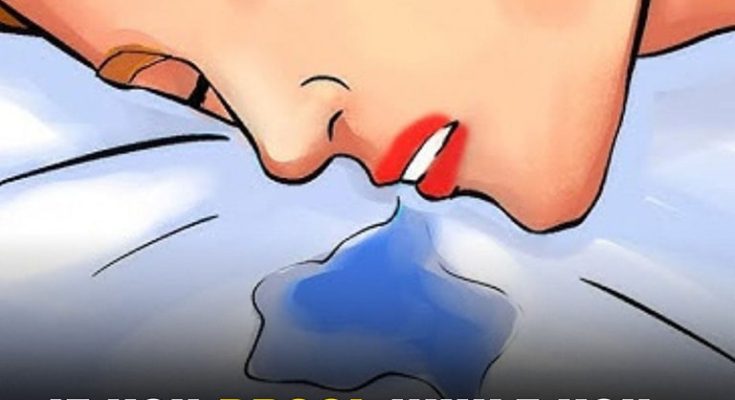Let’s be clear here: Drooling while you sleep is typically not a health concern whatsoever. In fact, it is quite normal. It can be somewhat embarassing, however, particularly if you drool after having nodded off on a bus, airplane, or on your mother-in-law’s new couch. Drooling while you sleep can also indicate that perhaps there is something else going on with your health that you should be having checked out by a medical professional. These are some of the reasons why you might drool while sleeping, what you can do about it, and how to know when to see a doctor.
10 Reasons Why You’re Drooling While Sleeping

There are so many reasons why you might be drooling while sleeping. Some people drool only while taking a nap but otherwise don’t at all. For others, waking up to a wet spot on the pillow is just a run-of-the-mill morning. Sometimes, these reasons are completely benign. However, there are some conditions that can cause you to drool while sleeping that you should consult your healthcare provider about. The following are the 10 most common reasons for droling while sleeping.
1. Sleep Position

When you sleep at night, your mouth produces extra saliva to help protect your gums and the inside of your mouth. The muscles of your body also relax during sleep, including those of your face and jaw. If you sleep on your side or stomach, drooling may be more likely to occur as excess saliva escapes from the sides of your mouth. This is more likely to happen if your nose is more stuffed up, because you will subconsciously sleep with your mouth slightly open in order to breathe better during the night. For this reason, you may notice you drool only during an allergy flare-up or when you have a cold.
2. Medication Side Effects

Certain medications, including sedatives, antipsychotic drugs, and some antibiotics, can lead to drooling as a side effect. Interestingly enough, some NSAIDs (aka ibuprofen) can also lead to drooling while sleeping. This is not a reason to stop taking your prescription medications, however, if it is bothering you, speak to your doctor about it. They can maybe prescribe you something else or change your dose so that this stops happening.
3. Nasal Congestion

As already mentioned, if your nose is stuffed up, then you will be forced to sleep with your mouth open. This congestion can be caused by cold or allergies and everything in between. There are medications that can help with allergies and also alleviate stuffy noses, however, make sure to consult your doctor before taking them. These conditions are, after all, temporary, and therefore so will be the drooling. It is not always worth it to take medications just to stop something that is not really affecting your health and vitality and that will stop as soon as your cold clears up or allergy season passes.
4. Deviated Septum

A deviated nasal septum can block airflow, causing mouth breathing and potential drooling during sleep. The septum is a thin wall of cartilage that separates your naval cavities. If this wall of cartilage is at all off-center, it can cause some issues with breathing, particularly at night time. There are surgeries to fix this, however, it is important to speak to your healthcare provider to determine if this is right for you.
5. Sleep Apnea

Sleep apnea, a condition where breathing pauses during sleep, can lead to mouth breathing and excess saliva, resulting in drooling. It is hard to know if you have this on your own. Other symptoms include loud snoring and sounds of choking. You will also find yourself often waking up not feeling well rested. Sleep apnea can affect those who live with you as well as your own health, so it is important to consult your doctor about your options for overcoming it.
6. Infection or Dental Issues

An infection in the mouth or gums, including cavities, can stimulate saliva production, leading to drooling. If you have an infection, you may notice pain, particularly while eating, swallowing, or trying to speak. You also may notice swelling, as well as blood while brushing your teeth. If you think you have an infection it is crucial that you visit your doctor or dentist as soon as possible to solve the problem.
7. Gastroesophageal Reflux Disease (GERD)

GERD is a condition that often leads to acid reflux, also known as heart burn. GERD can also lead to dysphagia or difficulty swallowing, resulting in excess salivation and drooling while sleeping. This is another important condition that does have a solution, so speak to your doctor if you have frequent heartburn and are drooling while sleeping.
8. Neurological Conditions

Conditions such as stroke, Parkinson’s disease, Alzheimer’s, Huntington’s disease, Bell’s Palsy, Cerebral Palsy, ALS, and brain damage can lead to sialorrhea, making it harder to swallow and causing drooling during sleep. Interestingly enough, a vitamin B12 deficiency can also lead to drooling issues. This is because a deficiency in B12 can also lead to neurological problems, hence the drooling.
9. Teeth Grinding

Nocturnal bruxism (teeth grinding at night) and wearing a mandibular device can be associated with drooling during sleep. It is important if you grind your teeth while sleeping that you don’t stop wearing your night guard. Speak with your healthcare provider if your drooling is becoming a problem and they can work with you to find solutions.
10. Pregnancy

Salivating more during pregnancy, known as ptyalism gravidarum, can lead to excess saliva and drooling while sleeping. Other reasons for drooling while sleeping during pregnancy can be due to increased stress due to the upcoming life change, swollen salivary glands, and difficulty sleeping, again either due to mental and emotional stress, physical discomfort, or both.
6 Ways to Stop Drooling While Sleeping

If you are finding that your drooling is getting out of hand and you want to make it stop, there are some things you can do to achieve that. Some are things you can do yourself at home, others you may have to consult healthcare professionals or other experts in order to complete them.
1. Adjust Your Sleep Position

As mentioned above, one of the number one reasons people drool at night is because they are sleeping on their side or stomach. One way to prevent this is to sleep on your back instead. If you are a dedicated side or stomach sleeper, this may take some time to get used to.
2. Home Remedies for Saliva Control

Maintaining a healthy saliva balance in your mouth is essential. Some home remedies that can help reduce drooling include biting on a lemon wedge, which is believed to help thin out saliva, and staying hydrated by drinking water regularly. Keep in mind that home remedies often don’t really have much science or research to back them up. You can give these a try, but don’t be surprised if you don’t notice much difference. Also, be careful with lemons and citrus, as these can be hard on your tooth enamel and gums.
3. Mandibular Device

Consider using a mandibular device, an oral appliance similar to a mouthguard, to improve sleep comfort and reduce drooling and snoring. These devices are available for purchase online or in specialty surgical supply stores. Using a mandibular device may help keep your mouth closed during sleep, reducing the chances of drooling.
4. CPAP Machine for Sleep Apnea

If your drooling is because of sleep apnea, a continuous positive airway pressure (CPAP) machine may help you put an end to it. As a (more important) bonus, it will help to treat your sleep apnea, as well. A CPAP machine helps maintain proper breathing and sleep patterns during the night. This will not only help you breath and therefore sleep better, but it may reduce your drooling as well. Consult with a sleep apnea specialist to receive guidance on using the CPAP machine effectively.
5. Botox Injections

No, botox isn’t just for cosmetic reasons – it can help reduce drooling, too. For individuals seeking a more aggressive approach to managing hypersalivation, Botox injections can be considered. Injecting Botox into the saliva glands surrounding the mouth can temporarily reduce saliva production. It is important to note, however, that this treatment is not permanent and will need to be repeated. It is also critically important that you consult a licensed professional, as having this done by someone who doesn’t have the right knowledge and qualifications can be detrimental to your health and wellbeing.
6. Surgery as a Last Resort

In severe cases where other treatments have been unsuccessful, a doctor may recommend surgical removal of the saliva glands. This option is typically reserved for individuals with underlying neurological conditions that contribute to excessive drooling during sleep. They typically won’t do this for those who simply are drooling while sleeping and want it to stop. Surgery can be an effective solution for managing hypersalivation, but it is usually considered as a last resort after trying other treatments.
When to See A Doctor About Your Sleep Drooling

If you consistently experience excessive drooling during sleep and it is interfering with your quality of life or causing discomfort, it may be time to see a doctor. This is especially if your drooling is accompanied by other symptoms, such as difficulty swallowing, facial weakness, changes in speech, heart burn, and any kind of pain in the mouth, jaw, or face. Furthermore, while lifestyle adjustments or home remedies may be beneficial, if they fail to alleviate the issue, consulting a healthcare professional is recommended. A doctor can conduct a thorough evaluation to determine why you are drooling while sleeping and investigate your other symptoms. This may include physical examinations, diagnostic tests, or referrals to specialists, to determine the root cause of the drooling and develop a personalized treatment plan to address the underlying issue, thus improving your sleep quality and overall well-being.
The Bottom Line

Drooling while sleeping is fairly common and is normally not a cause for concern. If it becomes excessive, however, begins all-of-the-sudden, or is accompanied by other concerning symptoms, it is important that you consult your doctor. These could be signs that something else is going on that could be a threat to your health and vitality. At any rate, it could likely be reducing your quality of sleep, which is as important to your health as any other lifestyle factor.



